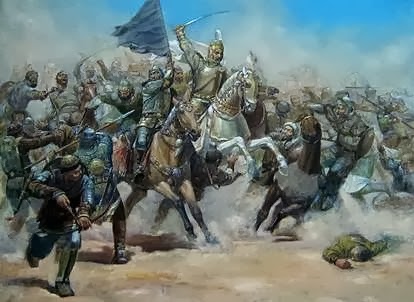
"The Ulus of Jochi " Topic
2 Posts
All members in good standing are free to post here. Opinions expressed here are solely those of the posters, and have not been cleared with nor are they endorsed by The Miniatures Page.
Please don't make fun of others' membernames.
For more information, see the TMP FAQ.
Back to the Medieval Media Message Board
Areas of InterestMedieval
Featured Hobby News Article
Featured Link
Featured Ruleset
Featured Profile Article The Editor tries out this first-year gaming convention in the San Francisco Bay Area (California).
Featured Book Review
Featured Movie Review
|
| Tango01 | 09 Mar 2014 10:51 p.m. PST |
"It seems to me that one of the most significant former powers that is all but forgotten today, at least in the western world, is the Ulus of Jochi. Presumably it is more well known in Eastern Europe and Central Asia where it was most dominant but it was a state that everyone should at least be aware of. The Ulus of Jochi (also later known in the west as the Golden Horde) was the dominant power of central Asia for quite some time and it had a significant impact on the course of history in Russia, Europe and the Middle East as well as Central Asia as various people banded together in opposition to the common threat of the dreaded Golden Horde. As the name implies, it has its origins in the career of Jochi Khan, eldest son of the great Mongol conqueror Genghis Khan (Ulus of Jochi simply means the ‘lands/state/realm/territory of Jochi') who, during the reign of his father, had played a leading part in the Mongol conquest of Siberia, Central Asia and Persia. He was to inherit the westernmost portion of the Mongol Empire when Genghis Khan died but as Jochi predeceased his father the Ulus of Jochi went to his son Batu Khan who is generally regarded as the true founder of this khanate which was part of the wider Mongol Empire. Ogedei Khan succeeded his father as Great Khan (or Emperor) of the Mongols while the Ulus of Jochi were divided between Batu Khan (who received the Blue Horde) and his brother Orda (who received the White Horde). Before he could concentrate on "nation building", however, Batu assisted Ogedei Khan in his conquest of the Jin Dynasty of Manchuria while his brother fought Bulgars, Cumens and other peoples in the west. After Manchuria was conquered (it would be left to Kublai Khan to conquer southern China), Batu Khan turned west and took on the formidable task of conquering the Russians. It was a brutal and bitter struggle but, in the end, Batu Khan was successful and the Russian states and all those in the area of modern Russia were devastated from Moscow to the Crimea. He conquered Ruthenia and drove the Cumens into the Kingdom of Hungary but when he demanded that these refugees be expelled, King Bela IV of Hungary not only refused but had the Mongol messengers killed (the Hungarians had a history of dealing with the Cumens, as we have covered previously, having earlier employed the Teutonic Knights against them). Batu Khan was outraged at this defiance and vowed to conquer Hungary and all the land to the Atlantic Ocean. Given that the man had just conquered Russia one can perhaps forgive him for being a bit arrogant. The Mongols swept westward, conquering Poland, Hungary and Bohemia, besting the forces of the Holy Roman Empire, alarming all of Europe and prompting the Pope to call for a crusade against them. Fortunately for Europe, the Mongols were not to stay long. The death of Odegei Khan prompted a power struggle and Batu Khan, reluctantly, returned home to press his claim to become the next Mongol Emperor. However, that came to nothing with the throne going to Guyuk Khan and so Batu returned to the west to focus on expanding his own central Asian kingdom. He further consolidated his rule and established his capital at Sarai in what is now southern Russia (near what is now Selitrennoye). Batu became so powerful that some believed Guyuk Khan considered him a threat and was preparing to move against him when he died in what is now the western Chinese province of Xinjiang. Batu Khan had reached such a position of influence that he was in large part responsible for placing the next Mongol Emperor, Mongke Khan, on the throne. Batu Khan set up the Princes of Vladimir and St Alexander Nevsky was one of his tributaries. Batu Khan died in 1256 as the master of central Asia and none of his successors would ever be able to outshine him…"


Full article here.
link Hope you enjoy!. Amicalement
Armand |
Puster  | 10 Mar 2014 10:51 a.m. PST |
>is all but forgotten today, at least in the western world The Mongols are certainly not forgotten – and neither is Liegnitz, one of the few battles were Poles and Germans fought together (one other notable one being Vienna some 400 years later). |
|

